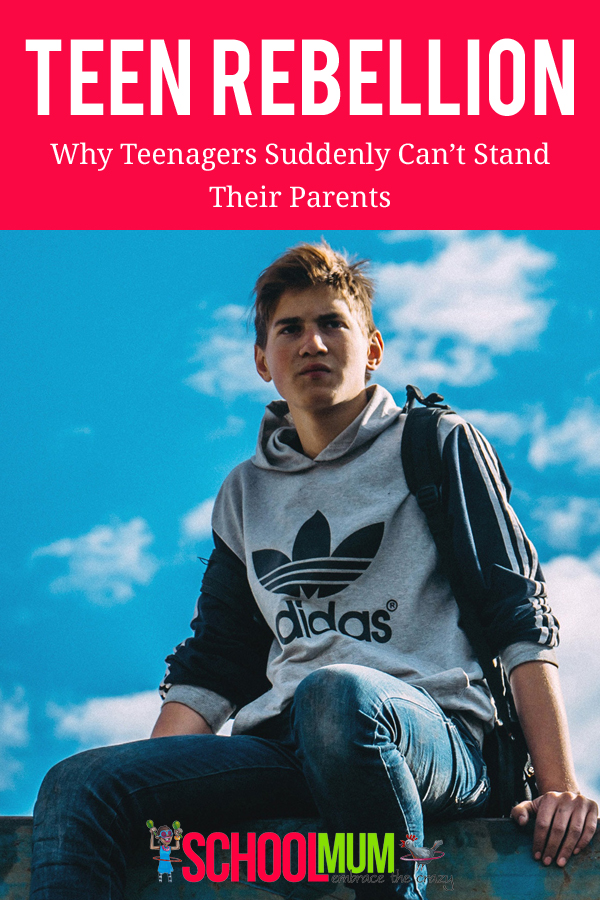It’s jarring and not a little bit traumatic when the teen rebellion hits. Your child suddenly decides you are the absolute worst. For years you’ve been the centre of their universe, and couldn’t even use the toilet in peace. Then enter the teen rebellion years and they become allergic to you.
Usually this ‘allergy’ will set in at around age 13. Sometimes you might see it intermittently, for an hour or a day at a time, and sometimes it sets in suddenly and lasts for years.
It’s no fun being the parent who can do no right and who is SO EMBARRASSING. If it’s happening to you, take comfort in knowing that this teen rebellion is not your fault – it’s just a natural stage of life.
And you don’t need to do anything except just ride it out.
The process of growing up means we need to learn how to be separate from our parents. This often starts where your child feels most comfortable and safe – in your home. They will suddenly feel a powerful urge to distinguish themselves from you. That’s not easy since they’ve spent pretty much all of their lives not only living with you, but also learning how to live from you.

Prepare for rejection
Kids going through the teen rebellion will start to analyse their parents’ behaviours and choices. They’ll sort them into two categories: those they accept and those they reject. And in the spirit of becoming someone quite different from you, there will be a fair bit of rejection.
Related: 4 ways to improve your relationship with your teen
What could usually be a simple difference of opinion about, say, the music you choose to listen to, becomes about so much more than that. Your child feels the need to share how much they despise your choices and what terrible choices they are. And it can become quite personal.
Why does it matter to your teen what radio station you listen to in the car when you’re driving alone? Because your child is making a statement about their identity. Until that fledgling identity has been well established, the need to loudly acknowledge anything they don’t align themselves with is strong.
Even if you agree
During the teen rebellion phase, even passions you have in common – such as playing tennis, for example – will become a source of awkwardness. While your child may not give these activities up entirely, just because it’s something they’ve always done with you, they may reject your involvement. They will seek out friends to play with instead. Sure, you could both be free on Saturday mornings and keen for a game, but your child can’t feel independent of you if you’re still locked in for a weekly hit together.

Basically, you can become persona non grata in your own home. Which is really hurtful if you take it personally. (And teenagers have a way of expressing themselves which makes everything sound personal.)
Eyes wide open
But the teen rebellion doesn’t have to be all doom, gloom and household friction. If you go into this phase with your eyes and your mind open.
Related: What you need to know about your teen’s bad attitude
It can help to understand that teen rebellion is a natural marker of development. It’s something that is necessary for your child to grow into an independent adult. Sure, we have to hop down off those pedestals our children have had us on since they were babies, but think of it as an opportunity to form a new relationship. One where our teens can get to know the real us, not just the superhero version.
If they’re walking a fine line when it comes to manners – or even crossing it with great strides – it can help to remind your teen that while they’re free to disagree and to be annoyed, but it’s never okay to be rude or disrespectful. This is a skill they need to practise at home in order to be good at it in the outside world.
Surviving the teen rebellion phase
But even if a parent goes into the teen rebellion phase understanding the importance of their teen extricating themselves from their shadow, the process will still hurt. It helps to have your own interests and friends – especially if they have teens as well. That way you can compare battle wounds and reassure each other that everything is as normal as it can be. And if you have a partner you’re parenting with, don’t forget to give each other compliments and reassure each other that your fashion choices and jokes are second-to-none.
Related: Why mums need to talk to other mums
There is a light at the end of the tunnel: once teens go through this process and establish their own personality, their parental allergy will usually clear up. They will develop the ability to sort our character traits into categories that they couldn’t before. They can dislike our taste in music but understand that it has nothing to do with them, and it doesn’t make us a terrible human.
And even better, our teens will develop the ability to share interests with us again.
The allergy will sometimes rear its ugly head again, but generally only in short bursts or moments of extreme potential embarrassment. Eventually, you’ll be able to sing along to your favourite tunes in the car again without it garnering a snide comment. One day, your teen may even find joy in singing along.
How’s the teen rebellion going at your place?

